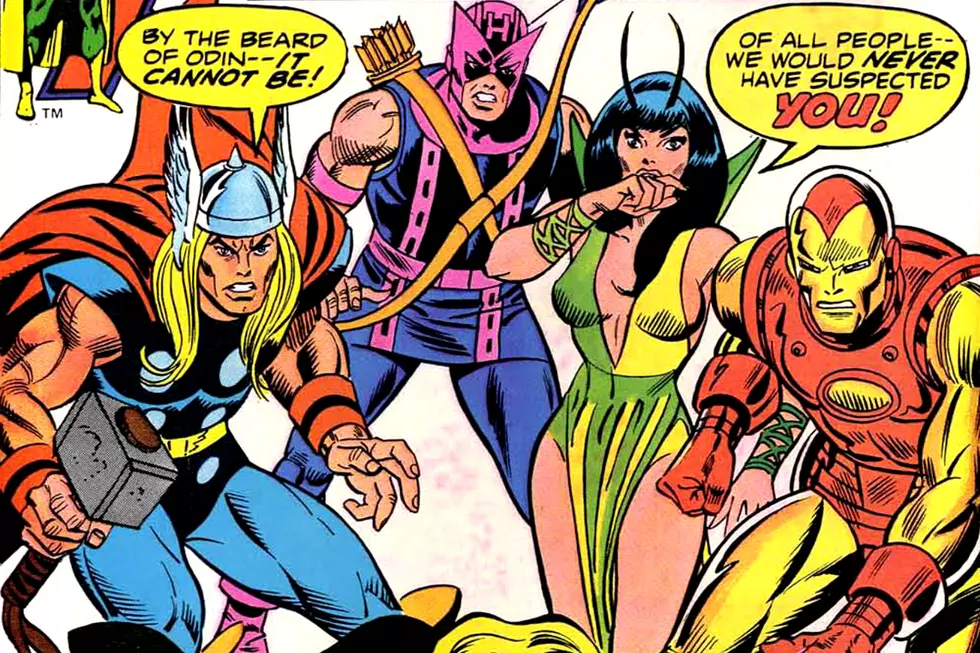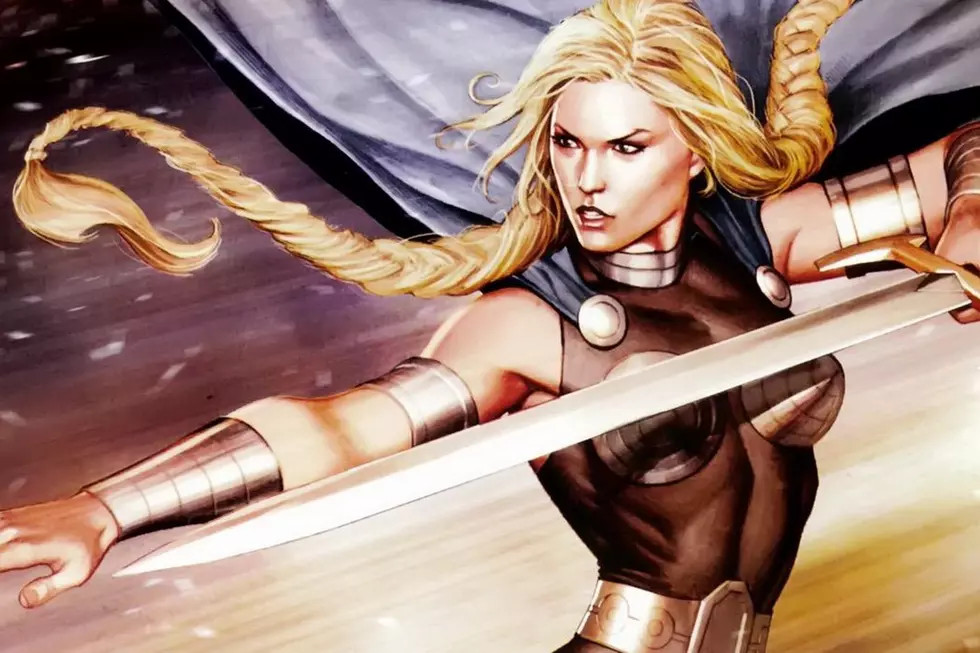![“We’re Here, We’re Queer, Get… Oh, We’re Going” [Opinion]](http://townsquare.media/site/622/files/2013/09/Hulkling-Wiccan-Kiss.jpg?w=980&q=75)
“We’re Here, We’re Queer, Get… Oh, We’re Going” [Opinion]
I hold Marvel's gay characters in special affection. I love them because they're Marvel characters -- flawed, freaky, forever young. I love them because they're gay characters; they live and love and fear and lust like I do. That's an aspect of fiction that I never got to enjoy when I was a kid.
But, reader; I worry. These characters are currently enjoying a moment in the spotlight, but what if it's only a passing beat? What if these characters -- and their lesbian and bisexual cohort -- only exist as a temporary corrective to the medium's, the genre's and the publisher's past shortcomings? What if the desire to make that correction passes, and the gay characters fade away?
What if it's just a phase?
It sounds alarmist, but when it comes to positive representation, LGBT audiences are used to expecting the worst only to learn that we were being optimistic.
As recently as 2006 it was Marvel reported policy to put an "explicit content" label on the cover of a book if it starred a gay character. The policy wasn't especially well observed, and when it was publicly challenged the then editor-in-chief Joe Quesada was quick to offer a course correction. He stated that the policy was no longer in effect, and he pointed to Freedom Ring, the star of Marvel Team Up, as evidence of the company's commitment to gay characters.
Weeks later, Freedom Ring was literally penetrated to death in a story designed to prove that not everyone has what it takes to be a superhero. Unusually for a Marvel hero, he remains dead seven years later.
I've brought all of this up before, but I believe it's worth bringing up again; it paints a very clear picture of the landscape that LGBT comics fans are used to. For a long time, LGBT characters were scarce, disposable, or non-existent.
The landscape has changed, in part because publishers now know that the conservative groups that once had them running scared are toothless, and in part because of a wider social shift towards better representation of minorities in the media.
Marvel has done excellent work expanding its stable of gay and bisexual characters and giving them a share of attention. It can't currently match DC in claiming an LGBT character with their own ongoing title (Batwoman), but it can boast a greater number of recurring lesbian, gay and bisexual superheroes, especially in supporting roles, especially in its X-Men family of titles. (Neither company has much to crow about when it comes to transgender heroes.)
Yet I still worry that these characters are too disposable. There are three male "power" couples in Marvel right now, and all three appear to be under threat.
Northstar and Kyle Jinadu received a great deal of media attention when they enjoyed the first same-sex super-wedding in the pages of Astonishing X-Men #51, by Marjorie Liu and Mike Perkins. (Some readers give that accolade to Apollo and Midnighter, but theirs was a civil union.) The couple have been a focus of the book since Liu took over writing early last year, but the book is cancelled with October's issue #68.
Northstar has a new home over in Jason Aaron and Ed McGuinness's Amazing X-Men, but Aaron has stated that the roster on his book is fluid; it can be "anyone who’s a teacher at the Jean Grey School". Even with seven X-Men team titles on the shelves, Northstar may no longer have a permanent place. The character spent much of the two decades prior to Astonishing X-Men either dead or in the wilderness. He could easily slip back there.
With Rictor and Shatterstar, Marvel "turned" the characters gay and bisexual respectively. The hints were there in their histories, but Peter David brought it to the fore and established them as a couple.
Their book, X-Factor, ends with issue #262 in September. We know that series writer Peter David has another series lined up, and X-Men line editor Nick Lowe said at San Diego that other writers are keen to get their hands on the characters orphaned by that title's closure -- but there's no word yet on where we might see this couple again, or if they'll survive as a couple, or if they'll survive at all. A huge question mark hangs over their future.
The third power couple are the only established LGBT characters in any current Avengers team: Wiccan and Hulkling. The current arc of Young Avengers, by Kieron Gillen and Jamie McKelvie, sees the characters going through a rough patch. That will probably pass.
My greater concern is that Gillen has only ever talked about a "first season" on the book. There's no word on what comes after that. Hopefully the title will continue into a second season with these characters in place. Of all three couples, Wiccan and Hulkling have the most plausible future. Yet Young Avengers is a title that's been plagued by erratic scheduling. There's no reason to be confident that we'll still be reading about these characters next year.
There is only one lesbian couple that I can think of currently appearing in a Marvel title, and that's Valkyrie and Anabelle Riggs in Fearless Defenders. They're much less well-established than the other couples, and series writer Cullen Bunn recently introduced a complication to their relationship that prevents it being a typical love affair. They're also in a book that sells less than Astonishing X-Men and about the same as X-Factor, so their future is far from secure.
There were other major lesbian couples in the Marvel universe. Runaways characters Karolina Dean and Xavin suffer from being Runaways characters, and not ones "lucky" enough to be Hunger Gamed in Avengers Arena. Like the title that introduced them, they're semi-permanently consigned to limbo. Cosmic heroes Phyla-Vell and Moondragon were frozen out of the new Guardians of the Galaxy title, and there's no sign of them factoring in to the current Infinity epic. (Phyla-Vell is technically dead right now, if that's worth mentioning.)
There are no other LGBT characters that I know of in any surviving title's core cast. Karma is also made homeless by the loss of Astonishing X-Men. Julie Power and Striker disappeared with the cancellation of Avengers Academy. X-Treme X-Men's James Howlett is no more. Hercules, alluded to be bisexual in a joke at his funeral and in one ambiguous scene in his own title, remains buried.
Living Lightning, outed as a joke eight years ago, has barely been seen since. Technically he was the first male Avenger to be established as gay, which ought to earn him some sort of marquee status, but he remains an obscure punchline. There's a small handful of LGBT characters kicking around in the supporting casts of other Marvel books. Anole. Bling. Cullen Bloodstone. One presumes that Graymalkin is still out there somewhere.
Few of these heroes occupy positions of importance in the Marvel Universe. They remain highly disposable. Like Northstar before Astonshing X-Men, like Hulkling and Wiccan in the hiatuses between Young Avengers series, LGBT characters don't often crop up in other books when they don't have books of their own. If Wolverine or Captain America disappear or die, it's an event. If Northstar disappears or dies, it's a panel.
Lesbian, gay and bisexual characters aren't vulnerable or disposable because they're LGBT. They're vulnerable and disposable because they're relatively new and relatively unimportant to the grand narrative. They're in the same class as all the other B-list characters, and like those characters their presence in a story is generally tied to an individual author's affection for them. When that author moves on, the characters get dropped back in the toy chest to wait for someone else to come along and pick them up.
It's the fact that all LGBT characters belong to this class of disposable characters that's problematic. That quality of being disposable has also historically been a problem for most non-white characters, most female characters, but there have been exceptions like Black Panther, Storm and Sue Storm, and writers made concerted efforts to raise the profile of characters like Luke Cage and Captain Marvel and integrate them more fully into the grand narrative.
LGBT characters need that sort of support and endorsement to keep them in the spotlight. Right now we're on a bubble where Rictor, Shatterstar, Northstar, Karma, Wiccan, Hulkling and Valkyrie could conceivably all disappear from our comics within the space of a few months, following Karolina and Xavin and Phylla and Moondragon into obscurity.
There aren't enough LGBT characters around to guarantee their presence in the Marvel universe. There aren't any high profile LGBT characters that play a role in the publisher's big events, like AvX and Infinity. Given how Avengers-led the Marvel Universe has been for the past ten years, a few adult lesbian, gay and bisexual Avengers would go some way towards fixing that problem. Just one adult transgender superhero who isn't a shapeshifter would be a step forward.
Compared to how things looked a few years ago, we're living in a golden age of LGBT representation in superhero comics, and Marvel can be proud of the part it played in making that a reality. But with any luck this is not the golden age; with a sustained commitment to diversity, Marvel's roster of LGBT characters can get a lot better.
Or it can get worse. The bubble can burst and those characters can fade away for twenty years, like Northstar. That power rests with Marvel, and the creators that write and draw for them.
I'm fearful of the worst. But I'm hopeful for the best.
More From ComicsAlliance









